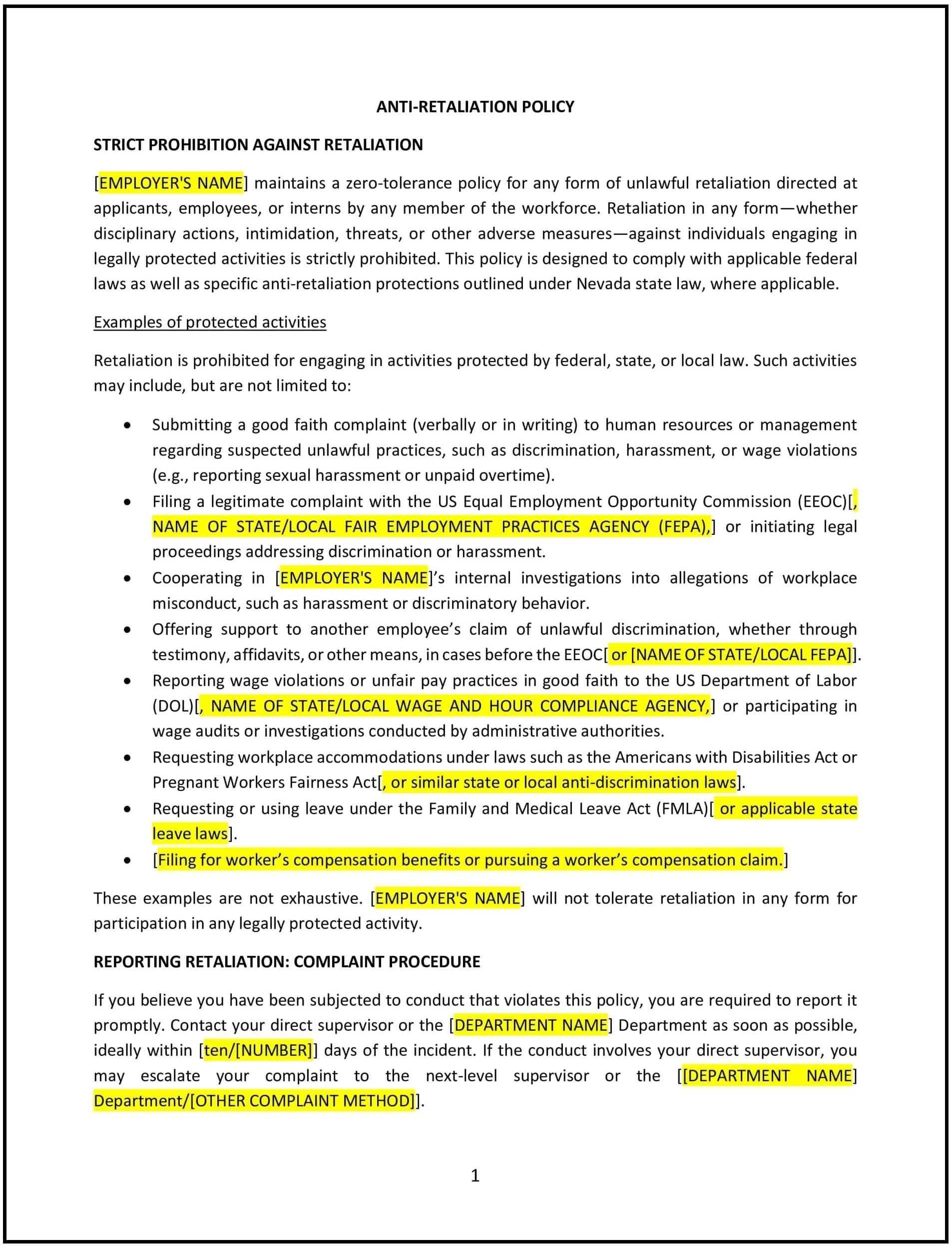Got contracts to review? While you're here for policies, let Cobrief make contract review effortless—start your free review now.

Customize this template for free
Anti-Retaliation policy (Nevada)
This anti-retaliation policy is designed to help Nevada businesses prevent retaliation against employees who report misconduct, file complaints, or participate in investigations. Whether an employee reports discrimination, harassment, safety violations, or other concerns, this policy ensures that they will not face adverse consequences for doing so.
By adopting this policy, businesses can promote a fair and transparent workplace, promote compliance with Nevada state laws, and protect employees from retaliation, fostering a culture of openness and accountability.
How to use this Anti-Retaliation policy (Nevada)
- Define retaliation: Clearly outline what constitutes retaliation, including any adverse actions such as termination, demotion, reduction in hours, or harassment in response to a complaint.
- Set reporting procedures: Provide employees with clear, confidential ways to report retaliation if they believe they have been subjected to adverse treatment after making a complaint or participating in an investigation.
- Ensure protection during investigations: Emphasize that employees who report concerns or participate in investigations will be protected from retaliation throughout the process.
- Clarify the role of managers and supervisors: Specify that managers and supervisors are responsible for maintaining a harassment-free environment and ensuring that retaliation does not occur after a complaint is made.
- Outline consequences for retaliation: State that employees found engaging in retaliation will face disciplinary action, which could include termination or other corrective measures.
- Encourage transparency: Promote open communication channels and a culture where employees feel safe to report issues without fear of retaliation.
Benefits of using this Anti-Retaliation policy (Nevada)
This policy provides several key benefits for Nevada businesses:
- Promotes fairness: Ensures that employees are treated fairly and are not penalized for reporting misconduct, helping maintain trust between employees and management.
- Enhances legal compliance: Helps businesses comply with Nevada state laws and federal regulations protecting employees from retaliation, reducing the risk of legal liability.
- Fosters an open environment: Encourages employees to speak up about any concerns, creating a more transparent and accountable workplace.
- Supports company culture: Establishes a clear expectation that retaliation will not be tolerated, supporting a positive and inclusive work environment.
- Protects employees: Safeguards employees from negative consequences when they act in good faith to address workplace issues.
Tips for using this Anti-Retaliation policy (Nevada)
- Communicate the policy to employees: Make sure all employees understand the policy and feel confident that they will not face retaliation for reporting misconduct.
- Establish a clear reporting process: Ensure that employees have multiple channels to report retaliation or concerns, and that these channels are easily accessible and confidential.
- Educate managers: Provide training for managers and supervisors to help them recognize and prevent retaliation and to reinforce the importance of maintaining a safe environment for employees to report issues.
- Take complaints seriously: Investigate all reports of retaliation promptly and thoroughly, taking appropriate corrective action when necessary.
- Update the policy regularly: Review and update the policy as needed to ensure it aligns with changes in Nevada law or company practices.